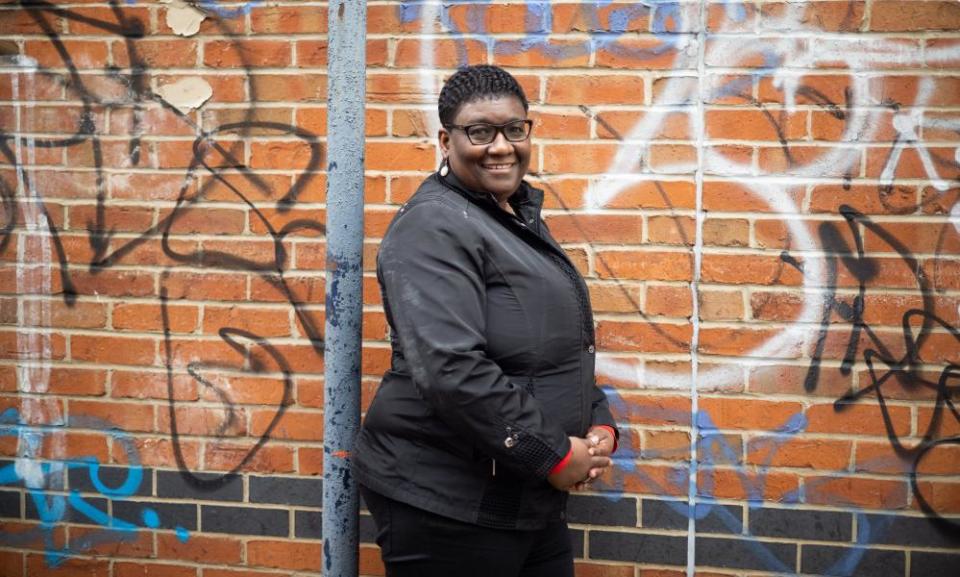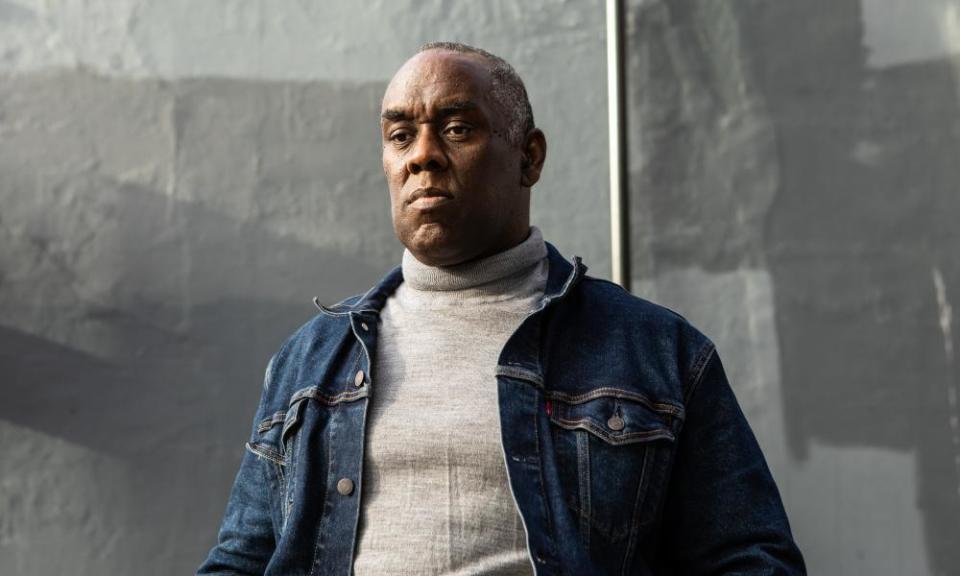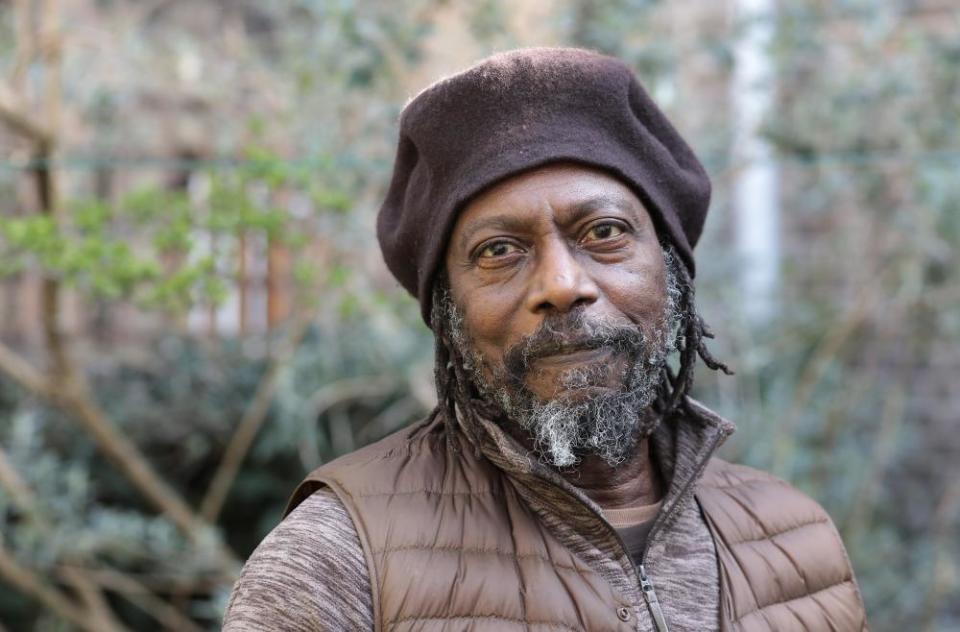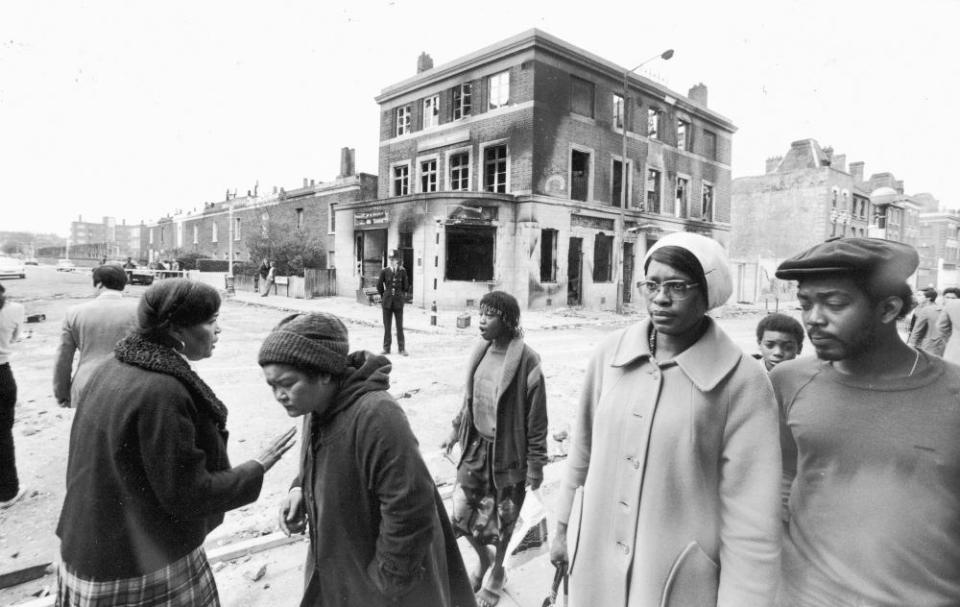Brixton riots 40 years on: ‘A watershed moment for race relations’
It’s been 40 years since Ros Griffiths watched her neighbourhood burn to the ground. Then 15, she wandered the streets through one of the most devastating civil disturbances England has seen, in a state of shock. “As I got into the area, you could see the fighting. It looked like war.”
But even amid the smoke, fire and police cars that tore through the streets, Griffiths still remembers the reggae music that played softly into the night.
Brixton was then the centre of the UK’s black community, Griffiths said, with young people from across the country coming down for the weekend to enjoy its cultural vibrance. From the protests and literature to the sound systems, the street corners reverberated a simple yet powerful political message: black is beautiful.
For her generation of black Britons, plagued by mass unemployment, poor housing conditions and police brutality, it was a message they desperately needed to hear.
But as she walked through the wreckage, she saw the consequences of decades-long tension being ignored. The violence, which over the next summer would sweep through a number of England’s inner cities, was widely condemned.

Griffiths said what happened in Brixton all those years ago helped her peers, the generation that followed Windrush and who wrestled most painfully with the identity of being black and British, to make a stand.
“For me, the Brixton riot was a Brixton uprising,” she said. “It was a watershed moment for race relations.”
* * *
Alex Wheatle moved from Shirley Oaks children’s home to a social service hostel in Brixton when he was 15. He immediately fell in love with the place – the all-night parties, the record shops, and using what money he had to be as stylish as possible.
“It was like an awakening to my culture,” he said. “For the first time in my life, I felt like I belonged.”

There was a political awakening, too. “Everyone knew of a tale of a young black guy being hauled into the police cells and getting beaten up,” he said. “No one listened to us, no one believed us.”
The issue went much further than the police. Wheatle remembers waiting on corners for builders’ vans to pick them up for a day’s labour. When he went to Brixton unemployment exchange, he saw that the jobs there for young black women were as chambermaids.
Wheatle said the New Cross fire, in which 13 young people died in a blaze during a birthday party at the beginning of the year, crystallised what many black Britons felt at the time: that the people in power did not care about them.
“Something systemic was happening in terms of racial discrimination. It was being observed in schools, in the job market, in policing and the courts,” said Colin Prescod, a British sociologist and chair of the Institute of Race Relations.
The optimism of the Windrush generation, who had hoped their children would be able to get a decent education and jobs, had evaporated by the late 1970s, Prescod said. The “dashing of the migrant settler dreams” was felt acutely by the black Britons born in the country.
In the first seven weeks of 1980, there was a 78% increase in street crime over the previous year in the so-called L district, which included Brixton. One tool used to crack down on street crime by the police was “sus”, which was a charge of loitering with suspicion to commit a criminal offence.

In the run-up to April 1981, “Operation Swamp 81” was planned, a special police exercise that began on 6 April and was meant to finish on 11 April. It consisted of 100 officers patrolling in plainclothes in certain areas between 2pm and 11pm daily. About 1,000 people were stopped and 100 arrested for a variety of offences, of which only a few were for robbery or burglary.
On 10 April, the first warm day of the year, PC Steve Margiotta tried to stop a distressed young black man who was bleeding from a stab wound. The young man ran away and a crowd formed around Margiotta and his colleagues.
Related: Black youth unemployment rate of 40% similar to time of Brixton riots, data shows
That night, Brixton was awash with false rumours that the police had prevented the young man from getting treatment and he had died. There was an increased level of policing the following day, and in the afternoon of 11 April two police officers patrolling Atlantic Road questioned a man sitting in a car outside a car hire firm.
“Everyone knew that something big was going to happen, everyone knew it. When it did, I just followed the crowd and just raced into Atlantic Road. And by the time I got there, they were rocking a police van from side to side, and it smashed on to the road,” Wheatle said.
By then there were hundreds of people throwing things at police officers on Atlantic Road and into Coldharbour Lane. Julian Skellett, then a 24-year-old student living in Brixton, was in a pub drinking with friends. “I looked out of the window and I saw this police car, which I think was a panda, upside down and in flames,” he said. The pub landlord locked the customers in and they stayed there for several hours.
“It was exhilarating. It was empowering. It was frightening because in the corner of your mind you’re thinking: lord God, if the police catch you in a cell, you’re finished,” Wheatle said. “But the exhilaration to actually see the police in retreat was something I’d never seen before. It is usually us running away from the police.”
By the evening, crowds were throwing petrol bombs. The Windsor pub was burning and flares could be seen all over Railton and Mayall roads. The fire brigade and ambulance crew were caught in the crossfire.
By the end of the weekend, hundreds of civilians and more than 350 police officers had been injured . Two dozen buildings had been set ablaze, causing damage estimated at £7.5m.
A now-retired Metropolitan police officer, who was deployed to Brixton from east London, remembers walking around the area in the early hours of the Monday morning with a bizarre sense of deja vu. “I realised what it was. As it got lighter, you could see it was like the pictures of the Blitz. It looked like it looked as though there’d been a bombing raid in Brixton.”

* * *
Wheatle was arrested a few weeks after the riot and later imprisoned for taking part. While he was in prison his cellmate Simeon encouraged him to write about his experiences: his story was important.
In the decades that followed, the acclaimed director Steve McQueen would agree, and he featured Wheatle’s life in an episode of Small Axe. It explores how Wheatle, known as the Brixton Bard, became a successful British novelist, writing the acclaimed book East of Acre Lane.
He wasn’t the only one to find his voice. “I had the confidence to say enough is enough, I’m not having it. You will not call me these racial slurs, you will not refer to me as if I’m inadequate,” Griffiths said.
Brixton itself has changed over the years, and so too has British policing. Following a report by Lord Scarman, who led an inquiry into the riot, the government passed the 1984 Police and Criminal Evidence Act, which regulated stop and search, and it set up the Independent Police Complaints Authority in 1985.
Prescod doesn’t believe that would have been possible without the riots and the movement that followed. “Riots pushed the analysis of racism in this country,” he said.
As for Griffiths, remembering the past is important for changing the future. She is excited by the hunger of young people today to make a difference in their communities, especially those involved with Black Lives Matter protests. Their fight is similar to her generation’s struggle.
“1981 was a very significant time in my life. I was fighting to belong somewhere,” she said. “I am accomplished now and my focus is on passing on the baton on to the next generation of young leaders.”

 Yahoo Finance
Yahoo Finance 